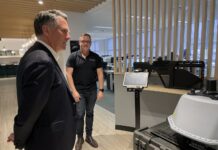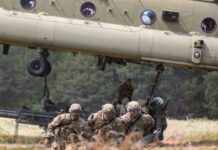Successful achievement of the SSN-AUKUS programme’s objectives will require a huge international effort in developing the infrastructure and skills needed to support this next generation of nuclear-powered submarines. Currently tasked with sustaining the entirety of the British Royal Navy’s submarine fleet, defence and engineering conglomerate Babcock International Group PLC has a key part to play in this endeavour. MDM recently interviewed Sir Nick Hine, Managing Director of Babcock’s AUKUS & International business about the once in a generation challenges and opportunities the programme presents.
MDM: Please explain the significance of the AUKUS submarine programme to the United Kingdom and the other partner nations in strategic terms?
Sir Nick Hine: AUKUS is the biggest, most ambitious strategic security partnership in our lifetime. It is a trilateral agreement which will play a vital role in both deterrence and defence, particularly in the Indo-Pacific region. Historically, the United States has only shared its submarine capability with the United Kingdom but this new collaboration welcomes Australia into the equation. It gives the three nations, all of which are part of the Five Eyes Intelligence Alliance, the opportunity to work together on a state-of-the-art submarine programme and help Australia deliver its strategic goals in the Indo-Pacific region. In a period of increased geopolitical instability, Australia needs to develop its sovereign defence capability, and develop it at pace. AUKUS is central to this.

Credit: US Navy
MDM: What are the benefits to the Royal Navy in building its next submarines as part of an international partnership? What are the potential downsides of this approach?
Sir Nick Hine: There are multiple benefits to the Royal Navy working with its allies on its next generation submarines. Building at a larger scale reduces cost and risk, while at the same time allowing the creation of stronger and more resilient supply chains. Working with the United States and Australia allows both countries increased interchangeability and interoperability in equipment and skills. Submarine programmes are inherently complex and close collaboration between governments and industry is therefore particularly important. This is a national endeavour for Australia; a programme of huge scale, where the nation will benefit from the same world class platforms as the Royal Navy. The AUKUS submarine programme therefore ensures our allies around the world are well positioned to deal with any threats.
MDM: What new capabilities will the SSN-AUKUS provide over and above those embedded in current nuclear-powered attack submarines, such as the Astute and Virginia classes? What technological and operational changes are likely to influence the design of the new boats?
Sir Nick Hine: Australia’s inaugural nuclear-powered submarines will benefit from enhanced technology over their predecessors. The new nuclear-powered submarines will be quieter and have better crew facilities. They will be more efficient and have improved power distribution and propulsion.
MDM: Can you summarise Babcock International’s role in the AUKUS submarine programme, including the specific capabilities your company adds to the project?
Sir Nick Hine: Babcock is a world leader in nuclear sustainment and there is no one better qualified to be a partner to the Australian Government to assist the delivery of the nation’s inaugural nuclear-powered submarines. We can support the infrastructure, skills and regulatory environment needed to achieve this endeavour because we have lived this for 60 years through supporting the Royal Navy in the United Kingdom. We operate Britain’s only nuclear licensed sites with the capability to conduct the deep maintenance, defueling, and ultimate disposal of nuclear submarines. In addition, Babcock is the premier warship sustainment company in Australia and New Zealand, making us well placed to build on our role of providing Australia with critical support services.
It is also worth noting that we have partnered with American global defence giant Huntington Ingalls Industries (HII) to support and develop capability under the AUKUS trilateral agreement.
For Babcock, this is an opportunity to leverage our technical capability. It will allow us to grow both our British and international business, creating high quality jobs at home while also allowing us to expand our activity in Australia, helping to solve our customers’ most complex challenges.
MDM: Please outline the main challenges that need to be overcome in delivering the SSN-AUKUS project to time and to budget? What steps can be taken to mitigate these?
Sir Nick Hine: To ensure AUKUS acts as an effective deterrent, delivering capability at pace is crucial. Babcock has welcomed the Australian government’s recent announcement that ASC Pty Ltd – the former Australian Submarine Corporation – will be the sovereign sustainment partner to support the Virginia (SSN-774) class submarines and, then, SSN-AUKUS. We are proud, long-standing partners of ASC and work with them to sustain Australia’s current Collins Class submarines. We stand ready to support them into the future. The Australian government has clearly stated ASC will need support from British and American partners, such as Babcock, to deliver this capability.
There is also a critical skills shortage – and a competitive jobs market – which needs to be addressed. While speed is of the essence, it is important to acknowledge that AUKUS is a multi-decade programme. There are once-in-a-lifetime opportunities for young people living in Australia, the United States and the United Kingdom to support this huge endeavour, where people who will soon be finishing school could feasibly work on it for the majority of their career. At its peak, AUKUS will support more than 21,000 jobs in the United Kingdom alone. We need to be ambitious and creative in the planning for this, encouraging people into a career in defence and ensuring we have the right partnerships in place to increase skills and get them working on the programme.

Credit: Babcock International
MDM: What progress has been achieved since the pathway to delivering SSN-AUKUS was announced in March last year? What are the next critical steps?
Sir Nick Hine: The establishment of AUKUS is, of itself, a huge achievement but there is a lot to get done. Infrastructure should be a major, immediate focus. We need shovels in the ground to prepare for the build, support and operation and we need to turn our minds to the regulatory and support requirements needed to maintain and sustain nuclear-powered submarines into the future. As mentioned previously, skills provision is another critical next step. Being able to say you work in defence and play a role in creating a safer and more secure world should instil a huge amount of national pride. Accordingly, we need to be encouraging people into this rewarding career.
MDM: Finally, what implications, if any, does SSN-AUKUS have for the partner nations’ wider industrial base, for example in the nuclear sphere?
Sir Nick Hine: This is a fantastic opportunity for UK PLC. As a nation, we are world leaders in submarine design and build. Babcock has played a historically important role in this; our patented weapons handling and launch systems are found on all Royal Navy submarines and we have a world-leading record in sustainment. With AUKUS, Babcock, and other key strategic partners will need to build on this, which means upscaling for provision, skills, and the supply chain. AUKUS presents us with the opportunity to make the nuclear domain more stable in industrial terms. It is a generational opportunity, and we need to embrace it tri-nationally.
MDM’s questions were asked by Conrad Waters.
Biography: Sir Nick Hine KCB

Credit: Babcock International
In early 2023, Babcock appointed Sir Nick Hine KCB as Managing Director – AUKUS & International to lead this newly established division that aims to deliver key capabilities in support of the trilateral security treaty. Sir Nick is a former British Royal Navy Vice Admiral with decades of experience in naval strategy and submarine operations. He joined Babcock in the United Kingdom from the Royal Navy, where he was the Second Sea Lord. He brings with him a wealth of wider Government and industry facing knowledge which will be invaluable to the delivery of the AUKUS security partnership’s objectives.










